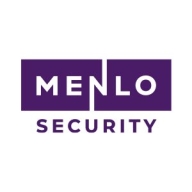


Cisco Secure Firewall and Menlo Secure are competitive options in network security. Cisco Secure Firewall is favored for support and pricing, while Menlo Secure is valued for advanced features and overall value.
Features: Cisco Secure Firewall is known for robust security measures, integration capabilities, and reliability. Menlo Secure features isolation technology, user-friendly prevention mechanisms, and efficient threat containment.
Room for Improvement: Cisco Secure Firewall needs better scalability, optimized performance, and enhanced integration options. Menlo Secure requires improved flexibility, intuitive management, and more integration features.
Ease of Deployment and Customer Service: Cisco Secure Firewall offers straightforward deployment and strong customer service. Menlo Secure, while efficient in deployment, has mixed feedback on customer support.
Pricing and ROI: Cisco Secure Firewall users are satisfied with setup costs and report a positive ROI. Menlo Secure, despite being more expensive, is seen as offering long-term benefits.



Fortinet FortiGate offers comprehensive network security and firewall protection across multiple locations. It effectively manages data traffic and secures environments with features like VPN, intrusion prevention, and UTM controls.
Organizations rely on Fortinet FortiGate for its robust integration with advanced security policies, ensuring significant protection for enterprises, cloud environments, and educational sectors. It facilitates network segmentation, application-level security, and authentication management, securing communication within and between locations such as branches and data centers. Its efficient SD-WAN and UTM features enable streamlined data management and enhanced threat protection capabilities. Users appreciate its centralized management, facilitating seamless operations across diverse environments.
What are the key features of Fortinet FortiGate?
What benefits should users expect from Fortinet FortiGate?
Fortinet FortiGate is crucial in sectors like education, offering robust networks for secure data flow between campuses and facilitating remote learning. In enterprise environments, it allows efficient management of application traffic and security across multiple branches, while in the cloud, it seamlessly integrates with diverse platforms to enhance security infrastructure.
Cisco Secure Firewall stands as a robust and adaptable security solution, catering to organizations of all sizes. It's designed to shield networks from a diverse array of cyber threats, such as ransomware, malware, and phishing attacks. Beyond mere protection, it also offers secure access to corporate resources, beneficial for employees, partners, and customers alike. One of its key functions includes network segmentation, which serves to isolate critical assets and minimize the risk of lateral movement within the network.
The core features of Cisco Secure Firewall are multifaceted:
The benefits of deploying Cisco Secure Firewall are substantial. It significantly reduces the risk of cyberattacks, thereby enhancing the security posture of an organization. This security also translates into increased productivity, as secure access means uninterrupted work. Compliance with industry regulations is another advantage, as secure access and network segmentation align with many regulatory standards. Additionally, it helps in reducing IT costs by automating security tasks and simplifying management processes.
In practical scenarios, Cisco Secure Firewall finds diverse applications. It's instrumental in protecting branch offices from cyberattacks, securing remote access for various stakeholders, safeguarding cloud workloads, and segmenting networks to isolate sensitive areas.
User reviews from PeerSpot reflect an overall positive experience with the Cisco Secure Firewall. Users appreciate its ease of configuration, good management capabilities, robust protection, user-friendly interface, and scalability. However, some areas for improvement include better integration capabilities with other vendors, maturity, control over bandwidth for end-users, and addressing software bugs.
In summary, Cisco Secure Firewall is a comprehensive, versatile, and reliable security solution that effectively meets the security needs of various organizations. It offers a balance of advanced protection, user-friendly management, and scalability, making it a valuable asset in the realm of network security.
Menlo Security Secure Application Access
Menlo Security Secure Application Access makes zero trust access easy, giving users secure connectivity to private applications, including web and legacy applications. At the core of Secure Application Access is the Menlo Secure Cloud Browser, which fetches, secures and delivers the content for users.
In addition to providing simple-to-deploy, clientless ZTA, Secure Application Access and the Menlo Secure Cloud Browser protect applications from attacks such as session hijacking, cookie manipulation, and other tactics that employ protocol manipulation.
Secure Application Access protects applications from Internet threats and provides granular controls for added protection of the application and associated data. These security controls include Read-only/Read-write, Upload/download, Copy/paste, AV scanning, Sandboxing, and Data Loss Prevention.
Last Mile Data Protection
Menlo Last-Mile Data Protection identifies and prevents sensitive data from leaving your company by meticulously inspecting all file uploads and user input across browsing sessions. Leveraging the Secure Cloud Browser, users are protected from the internet and you can protect your organization from data loss with comprehensive traffic monitoring and controls. This approach addresses the growing concerns surrounding data leakage in the age of AI tools like ChatGPT.
By identifying sensitive data through file types, regular expressions, or predefined libraries, Menlo Last-Mile Data Protection empowers security teams to regulate data input into AI platforms and prevent unauthorized uploads. This capability provides crucial protection for intellectual property, PII, and other confidential information.
The solution leverages the Menlo Cloud Security Platform's visibility and control over traffic to reliably detect and prevent data leaks originating from both browser submission forms and non-browser traffic. With the ability to inspect encrypted web traffic, Menlo Last-Mile Data Protection enforces DLP policies consistently across all users and devices, ensuring comprehensive data protection.
We monitor all Firewalls reviews to prevent fraudulent reviews and keep review quality high. We do not post reviews by company employees or direct competitors. We validate each review for authenticity via cross-reference with LinkedIn, and personal follow-up with the reviewer when necessary.